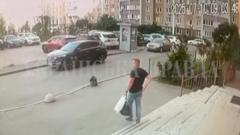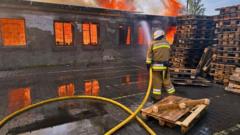Italian authorities’ choice to welcome conductor Valery Gergiev, known for his close ties with Vladimir Putin, has ignited a fierce debate surrounding cultural reconciliation and political affiliation, with vocal opposition from European leaders and human rights activists.
Reviving Controversy: Gergiev's Invitation Sparks Outcry in Italy

Reviving Controversy: Gergiev's Invitation Sparks Outcry in Italy
As Italy prepares for a festival that invites pro-Kremlin artist Valery Gergiev, criticism mounts over the decision amidst ongoing tensions from Ukraine's war.
Russian conductor Valery Gergiev, previously ostracized from European concert stages due to his enduring support for President Vladimir Putin and his inaction against the war in Ukraine, is set to make a controversial return to Italy. The regreso follows an invitation to perform at the Un'Estate da RE festival in the Campania region, which has elicited both support and significant backlash amid ongoing Russian military aggression against Ukraine.
Vincenzo de Luca, the regional governor, defended the decision, emphasizing the need for culture to remain separate from politics. He referred to Europe's blanket ban on pro-Kremlin artists as an "act of madness" and expressed pride in bringing Gergiev back to Italy, signaling a potential thaw in European cultural relations with the Russian arts community.
However, the criticism echoes loudly. Pina Picierno, a vice-president of the European Parliament, labeled the invitation as "absolutely unacceptable," condemning the conductor as a "cultural mouthpiece for Putin and his crimes." Her stance reflects broader concerns that Gergiev’s performance might dilute serious discussions about Russia's actions, with Ukrainian human rights activist Oleksandra Matviichuk calling the invitation "hypocrisy."
Russian opposition figures, including members from the Anti-Corruption Foundation linked to the late leader Alexei Navalny, are also rallying against Gergiev’s return, urging the Italian government to bar him from entry, asserting that a concert would serve the Kremlin's narrative.
Notably, Gergiev's career was abruptly halted following Russia’s invasion of Ukraine on February 24, 2022, when he declined to denounce the war during a performance at Milan's La Scala. His silence led to widespread cancellations across Europe, stripping him of prestigious titles and performances.
Local Italian political responses are mixed, with some, including senior members of Giorgia Meloni's Brothers of Italy party, defending Gergiev's artistry while warning against cultural retribution upon Russian artists, arguing that "if Russians must suffer for the mistakes of their president, we are committing a kind of cultural genocide."
Despite international condemnation—such as Canada's decision to bar Gergiev and freeze his assets— the European Union has hesitated to implement formal sanctions against him, as he has managed to maintain a delicate balance without directly endorsing the war.
Meanwhile, the European Commission has emphasized the need for cultural institutions to be wary of artists who condone aggressive actions in Ukraine, while the Campania region's support for Gergiev continues to raise eyebrows throughout the continent.
As the festival approaches, the dialogue surrounding Gergiev’s participation in Italy serves as a contentious reminder of the intricate relationship between art, politics, and the cultural repercussions of global conflict. The artistic director of the festival remains confident that Gergiev's performance will proceed, despite the growing controversy and opposition echoing across Europe.
Vincenzo de Luca, the regional governor, defended the decision, emphasizing the need for culture to remain separate from politics. He referred to Europe's blanket ban on pro-Kremlin artists as an "act of madness" and expressed pride in bringing Gergiev back to Italy, signaling a potential thaw in European cultural relations with the Russian arts community.
However, the criticism echoes loudly. Pina Picierno, a vice-president of the European Parliament, labeled the invitation as "absolutely unacceptable," condemning the conductor as a "cultural mouthpiece for Putin and his crimes." Her stance reflects broader concerns that Gergiev’s performance might dilute serious discussions about Russia's actions, with Ukrainian human rights activist Oleksandra Matviichuk calling the invitation "hypocrisy."
Russian opposition figures, including members from the Anti-Corruption Foundation linked to the late leader Alexei Navalny, are also rallying against Gergiev’s return, urging the Italian government to bar him from entry, asserting that a concert would serve the Kremlin's narrative.
Notably, Gergiev's career was abruptly halted following Russia’s invasion of Ukraine on February 24, 2022, when he declined to denounce the war during a performance at Milan's La Scala. His silence led to widespread cancellations across Europe, stripping him of prestigious titles and performances.
Local Italian political responses are mixed, with some, including senior members of Giorgia Meloni's Brothers of Italy party, defending Gergiev's artistry while warning against cultural retribution upon Russian artists, arguing that "if Russians must suffer for the mistakes of their president, we are committing a kind of cultural genocide."
Despite international condemnation—such as Canada's decision to bar Gergiev and freeze his assets— the European Union has hesitated to implement formal sanctions against him, as he has managed to maintain a delicate balance without directly endorsing the war.
Meanwhile, the European Commission has emphasized the need for cultural institutions to be wary of artists who condone aggressive actions in Ukraine, while the Campania region's support for Gergiev continues to raise eyebrows throughout the continent.
As the festival approaches, the dialogue surrounding Gergiev’s participation in Italy serves as a contentious reminder of the intricate relationship between art, politics, and the cultural repercussions of global conflict. The artistic director of the festival remains confident that Gergiev's performance will proceed, despite the growing controversy and opposition echoing across Europe.






















